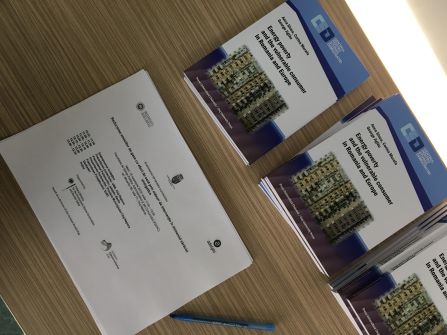Operative Roundtable
| Date |
Date
|
A successful project launch saw industry and government stakeholders come together to discuss their engagement with energy poverty.
A morning packed with meetings and presentations marked the inauguration of the exiting new project aiming to address energy poverty and greenhouse gas emission issues in the Cluj-Napoca Metropolitan area. This was the first chance for the project's implementing partners to present what is to come to the stakeholders that will be affected and involved.

The meeting was steered by the leading partners at Babes-Bolyai University and was kicked-off by one of their key note speakers, followed by introductory presentations by Andreas Schneller from adelphi, representatives from the Cluj-Napoca City Hall and the European Climate Initiative (EUKI) who will be funding the project. In attendance were over 20 stakeholder representatives from the sector, such as utility providers for gas, heating, and electricity, delegates from other municipalities, climate institutes, and researchers from other Universities.
The stakeholders gained an overview of what the project goals and objectives are, who they can refer to, and how they can be involved or benefit. The enthusiasm and interest was emphasized in an engrossing Q&A session which saw stakeholders engaging with the partners on the key aspects of the project. For many the topic of energy poverty is a new one, however, the eagerness to learn and get involved displayed how salient social, environmental, and heath issues are to the attendees.
The operative roundtable initiated the first phase of the project, which consists of collecting and analysing data affecting energy poverty and greenhouse gas emissions in the Cluj-Napoca Metropolitan area. The partners presented the stakeholders with a research outline and the indicators they have developed to measure energy poverty in the region. The involvement of the various stakeholders proved invaluable when it came to the discussion of data availability and data sources as it highlighted the possibilities for collaboration and knowledge exchange.
The positive exchange that took place throughout the roundtable left all partners eagerly anticipating a project characterised by close and constructive collaboration.
